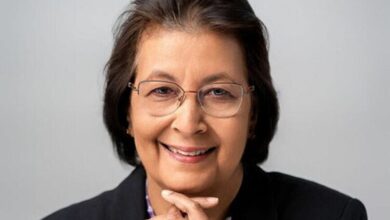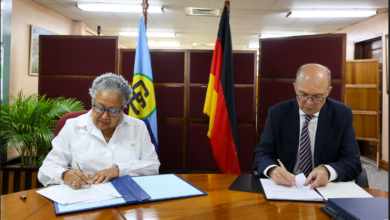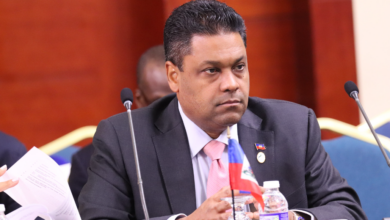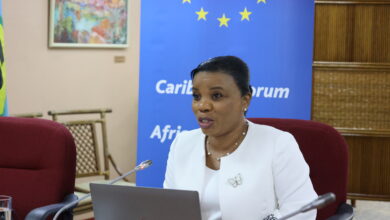It is my pleasure to be here this afternoon to join you for this closing session of the Seventh Meeting of the Council for Human and Social Development, which is dedicated to the presentation of the CARIFESTA VIII Programme by the Surname National CARIFESTA Commission led by Minister Walter Sandriman. I regret that I could not be with you before but as the Deputy Secretary-General would have pointed out in her remarks at the opening session, my absence was unavoidable. In fact I was involved in another important meeting of the CARIFORUM Council of Ministers and with the European Commission in St. Vincent and the Grenadines. You would perhaps, be happy to know that one of the things I did there was to invite them all to the Eighth CARIFESTA in Suriname.
I was informed that you have had a very exciting and useful meeting; one which covered much ground and at which there were many important issues debated, sometimes heatedly — but eventually satisfactorily resolved. I especially want to congratulate this Council for pursuing the integrated theme of “investing in human resources with equity” and for the intersectoral approach it has adopted for implementing its task.
I am particularly pleased to note that you have decided to focus in the next period on developing a human and social development strategy. The engagement of a cross section of partners from the Region's universities, private sector and civil society in the Futures Policy Group chaired by Professor Benn of UWI and former Director of TCDC, in the UNDP. is one attempt to bring together some of the finest minds to help the region in thinking through and developing critical policies for human resource development. I want to thank Professor Benn and his Team for taking on this serious challenge.
I am glad too, that this meeting has also focused on the critical issue of crime and security and has made important recommendations for the consideration of the Futures Policy Group and in particular, the CARICOM Task Force on Crime and Drugs, which meets next week. Crime and the Drug culture are major problems for our region which we must overcome. To continue on the present path would all but destroy the region's hope for social and economic development. I am therefore pleased to note that the COHSOD has recommended the involvement of civil society in the establishment of national and regional Multisectoral Crime Commissions. This fight against crime and drugs, like the fight against HIV/AIDS, which COHSOD also discussed, requires all hands on deck.
Permit me also to refer to the presence of the CARICOM Youth Ambassadors at this COHSOD. This is deeply symbolic and highly significant. When our Heads of Government recommended the introduction of the CARICOM Youth Ambassadors Programme, it was with the view that the Community would give full recognition to a critical role for youth in our present and future leadership. It was intended too, that the Community would socialize and integrate these Youth Ambassadors into the CARICOM system as advocates for the regional movement, with linkages to their National Youth Councils and other youth movements. What better way to promote regional integration?
I have deep feelings about this need, based on my own experience. As I always say, when I, as a youngster, left Trinidad and Tobago for the University of the West Indies, in Mona, Jamaica, I was what you may call merely a “Trinbagonian” . After four years of undergraduate study and graduate work, sharing experiences at the Mona campus with colleagues from all over this region, I returned home as an “unrepentant West Indian.” When I, therefore, had a three hour interactive session with over 40 young people last week-end at the CARICOM Youth Partnership Seminar in Port of Spain – 34 of whom were CARICOM Youth Ambassadors and the others executive members of other regional and National youth organizations — I could not help but re-live, through the vibrancy of my discussions with these young people, the birthing of my true Caribbean citizenship and identity. It is my hope that your Council, in which the responsibility for youth falls, will continue to nurture and contribute to the creation of more “unrepentant West Indians” (or Caribbeanites, if you wish) and to the .sustainability of this CARICOM Youth Ambassadors Programme, as an essential network that feeds into the decision-making process of our Community. I want to specially acknowledge the presence of these youth representatives:
Ambassador Valerie Lalji, the designated Dean of the Caribbean Youth Ambassadors Corp, Ambassador Sergio Balfor, Alternate Dean, both from Suriname; Ambassador Michael Alexander Deputy Dean, Trinidad and Tobago and Mr. Damien Hughes, President of the Caribbean Youth Federation.
The central purpose of our meeting here this afternoon however, is to focus on CARIFESTA VIII. It is with great pleasure that I extend a warm welcome to the Suriname delegation, led by the Hon Walter Sandriman Minister of Education and Community Development, including Culture.
CARIFESTA is one of those very important events in the calendar of this region contributing significantly to the quality of life of its citizens.. Thirty years ago, it was launched in Guyana. It was a most perceptive initiative, one which helped to foster the kinds of interconnections between our artistes and the community, and the bonding of regional sensitivity and sensibility about the value of our creative talents. It is most unfortunate that this Festival of Caribbean Arts has not been maintained on a regular basis, not withstanding the fact that the six other festivals held since 1972 – in Jamaica, Barbados, twice in Trinidad and Tobago and more recently, in 2000, in St. Kitts /Nevis–have illustrated the incomparable value of these events to the fostering of a Caribbean Identity.
We believe and continue to say that much more can be and must be done to support Culture. Very often however we conceive of “Culture” merely in reference to the performing arts. This is a narrow view, because culture lies at the heart of our very existence. It underscores who we truly are. It determines the basis of our relations with others. It defines how we overcome the barriers of race, class, and differences in religion and ideology. It underscores our propensity to achieve social cohesion as well as conflict. Culture is a pervasive factor in our systems of kinship, education, business practices and our general understanding and approach to life. It is all encompassing.
Indeed as one of the brochures from our Directorate of Human and Social Development states, Culture is the root and fruit of Development”.
It is for this reason that I take this opportunity to appeal to you, Ministers in the Social Sector, to revive your commitment to the development of the Caribbean Foundation for Culture and the Arts. Culture is a vital aspect of our aesthetics, but its economic value needs to be promoted and highlighted in this era of globalization. More specifically, our Festivals should be promoted more aggressively as cultural products form a cultural industry of international renown. Our writers – Nobel laureates Derek Walcott of St Lucia and Vidia Naipaul of Trinidad and Tobago — have demonstrated the heights that our Arts from the Caribbean can achieve.
Our music, especially our reggae and calypso have gained worldwide recognition. Our steel bands, which just concluded their World Festival last week-end in Port-of -Spain, Trinidad, attracted steel band orchestras from all over the world. This musical form is now taught as an option, along with the piano, violin and flute in degree programmes in Universities such as Northern Illinois, and in school systems, not only in the Caribbean, but also in England, USA, Japan Sweden, among others. It is a Tribute to this small Region that the steel pan is the only musical instrument to be invented in the twentieth Century.
It is time that we take these accomplishments and consolidate them in an enterprise such as the long overdue Caribbean Foundation for Culture and the Arts, lest we wake one morning to find that the benefits of the initiatives rooted in this Region are being reaped by others.
It is for all these reasons that we are pleased that Suriname has undertaken the task of helping the Region in this period of consolidation. The theme you have chosen for CARIFESTA VIII is a very apt one. I very much look forward to a most successful process as you have visualized it: Many Cultures – The Essence of Togetherness–The Spirit of the Caribbean – AND TO BEING A PART THEREOF.





